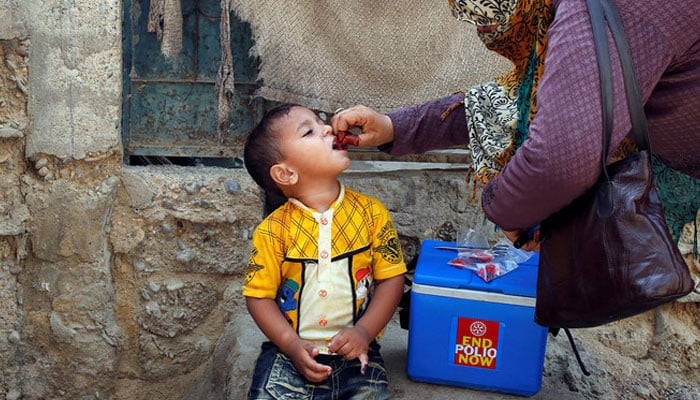Pakistan to get rid of poliovirus by end of 2023: UNICEF
UNICEF regional director says current data suggests that poliovirus is now under control in Pakistan
December 04, 2022

- UNICEF official hopes poliovirus would be eradicated from Pakistan by end of 2023.
- He says current data suggests that virus is now under control in the country.
- He expresses concern over attack on polio workers in some parts of Pakistan.
ISLAMABAD: Expressing his satisfaction over the effective measures taken against the crippling disease, Regional Director of UNICEF for South Asia George Laryea-Adjei Sunday hoped that the polio virus would be eradicated from Pakistan by the end of 2023.
In an interview with APP, Adjei said the current data suggested that the virus is now under control in the country.
“We are using all available resources and services at our disposal to reach every girl and boy in Pakistan with lifesaving vaccines and protect them against the entirely preventable disease,” he said.
Appreciating the efforts of over 350,000 health workers travelling to all parts of the country to administer doses of the vaccine to every child, he said the program is back on track to stop all wild poliovirus transmission.
Adjei said Pakistan was in a much better position today to eradicate polio than a year ago. However, there were challenges that hampered the efforts to eliminate the virus completely.
He expressed concern over the attack on polio and health workers in some parts of Pakistan and lauded the courage of polio teams.
He also appreciated efforts of polio eradication endeavours of the government and recalled that Pakistan was the first country to launch an ambitious program for training its health workers to support national immunisation programmes.
Highlighting the challenges, he said that the onslaught of back-to-back disasters — drought, heatwaves, floods, and acts of violence continued to put millions of children’s lives at risk in Pakistan.
He said the recent catastrophic floods destroyed vital health facilities and exacerbated health risks for millions of children, especially those living in districts historically at the highest risk for polio.
Referring to the impact of climate change, he said: “The impact is profound throughout South Asia and in 2022 alone, climate-induced floods in Pakistan, Bangladesh, northern India, and Afghanistan left over 15 million boys and girls in need of assistance.”
He pointed out that summers were getting hotter, glaciers melting, sea levels rising, and landslides sweeping away homes and schools.
The regional director said Pakistan was already a "climate hotspot" before the current emergency broke out.
According to UNICEF’s Children’s Climate Risk Index, children in Pakistan were at "extremely high risk" of the impacts of climate change, ranking 14th out of 163 countries and regions.
Since April, Pakistan has been hit by a series of extreme weather events. There was no spring this year, with the country going from winter directly into a scorching summer. Temperatures reached over 50 degrees Celsius in some areas of the country followed by catastrophic floods.
He said these reoccurring and escalating climate catastrophes were directly threatening children's lives and destroying infrastructure critical to their well-being.
First and foremost, global leaders must urgently limit global heating to 1.5 degrees celsius as this was the only way to save children’s lives, he suggested.
“We must prepare children to live in climate changed world through climate change education and green skills training,” the UNICEF official added.











